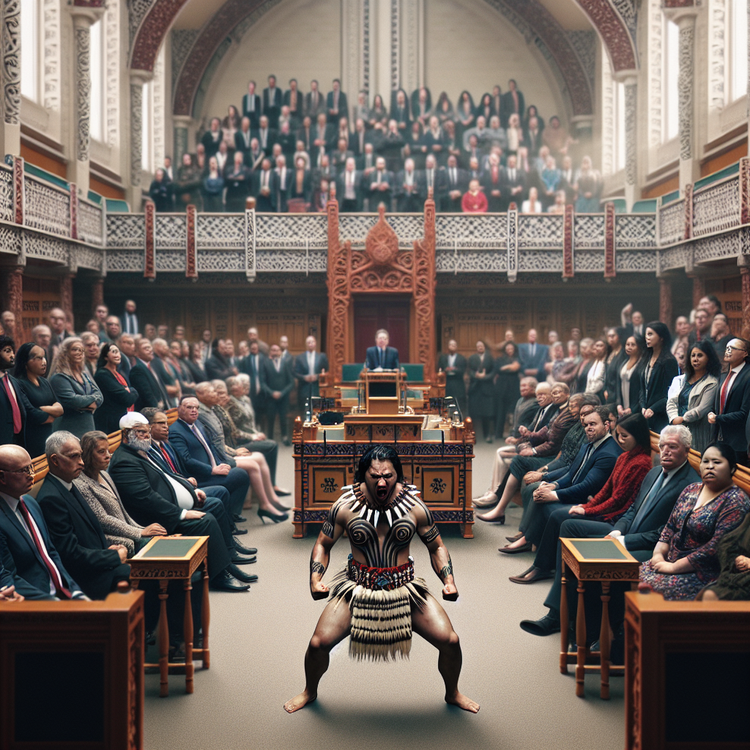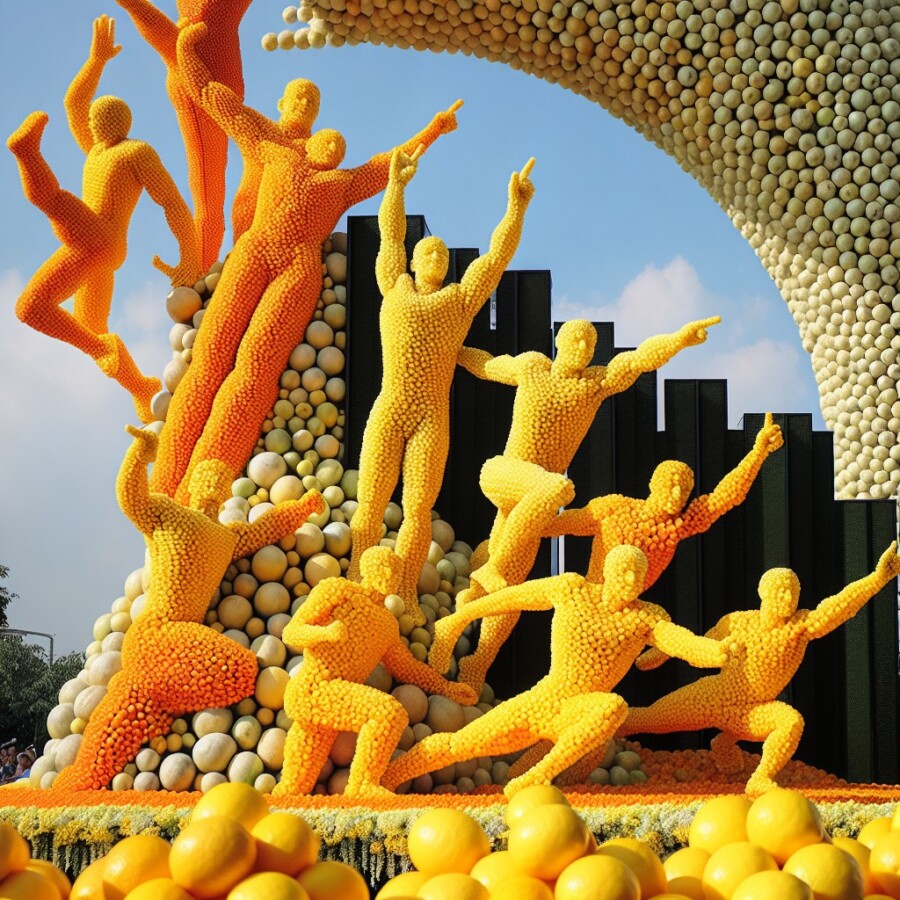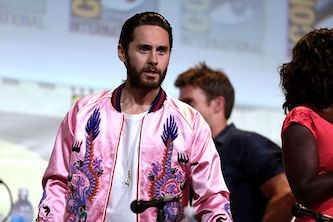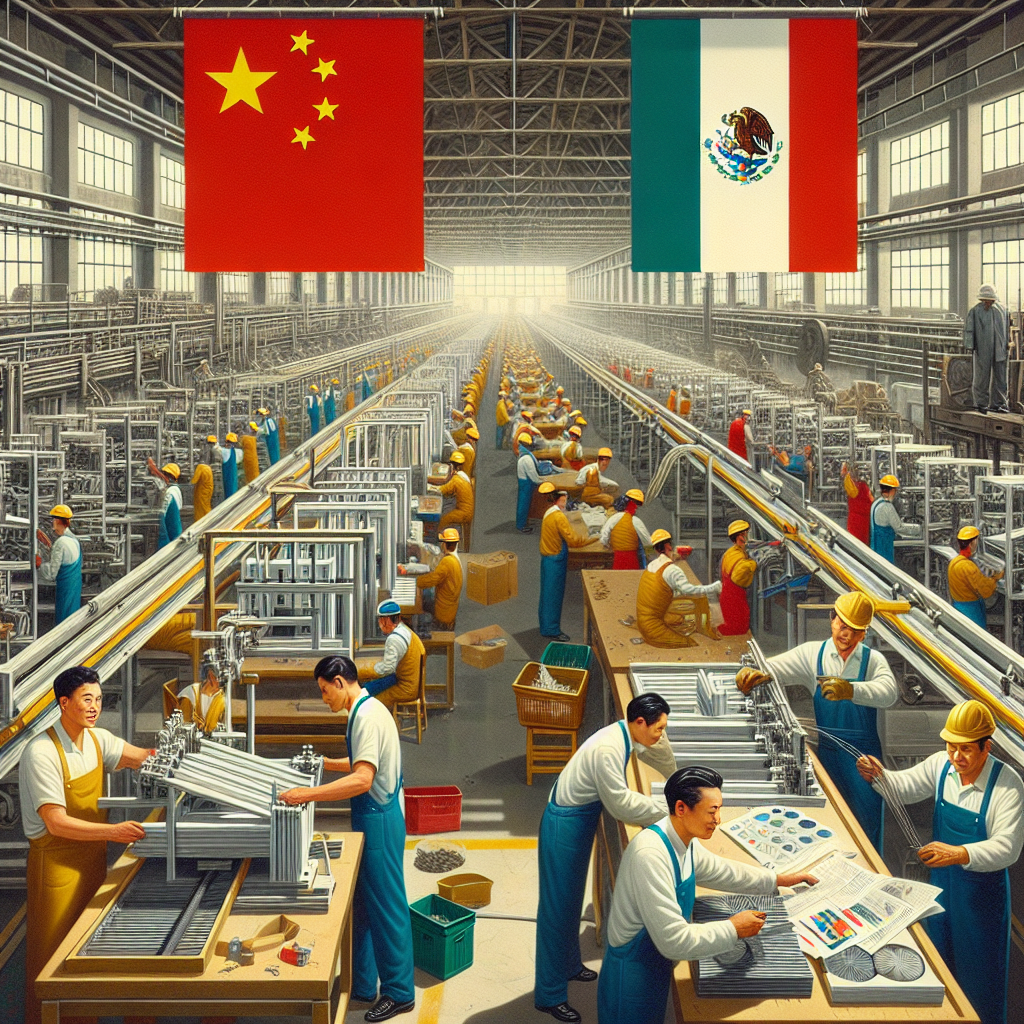A politician in New Zealand named Rawiri Waititi did something pretty cool when he was being sworn into parliament. Instead of just saying some words, he did a traditional Maori dance called a haka. The haka is a way for Maori people to show their strength and unity. Waititi wanted to show that he cares about Maori rights and wants to bring attention to the issues that Maori people face.
The haka is a big deal in Maori culture. It’s done on important occasions to show pride and identity. Waititi’s decision to do the haka before taking his oath was seen as a strong statement of his commitment to Maori rights. It also got people talking about the role of Maori culture and language in New Zealand’s government and society.
Some people think it’s really important to protect and celebrate Maori culture because it’s a big part of New Zealand’s identity. Others think it’s not necessary and causes division. The controversy around affirmative action policies and the use of the Maori language shows that Maori people are still fighting for recognition and equality in New Zealand.
Waititi’s haka got mixed reactions. Some people thought it was powerful and meaningful, while others thought it was disrespectful to break the rules of the ceremony. But no matter what people think, Waititi’s haka has started a conversation about Maori rights and the place of indigenous cultures in New Zealand.
Original news source: Watch: Maori MP performs haka before swearing oath to King (BBC)
Listen:
Slow
Normal
Fast
Vocabulary:
| 1 | politician | A person who works in the government and makes decisions for the country |
| 2 | sworn | Made a formal promise to do something |
| 3 | parliament | The place where laws are made and discussed |
| 4 | Maori | The native people of New Zealand |
| 5 | haka | A traditional Maori dance that shows strength and unity |
| 6 | unity | Working together as a group |
| 7 | pride | Feeling good about who you are and where you come from |
| 8 | commitment | A strong promise to do something and not give up |
| 9 | controversy | A disagreement or argument about something important |
| 10 | affirmative action | Policies that help groups of people who have been treated unfairly in the past |
| 11 | recognition | Being seen and respected for your achievements and qualities |
| 12 | equality | Treating everyone fairly and giving everyone the same opportunities |
| 13 | disrespectful | Not showing respect for someone or something |
| 14 | ceremony | A formal event or ritual with special rules and traditions |
| 15 | indigenous | Native or original to a particular place or area |
Group or Classroom Activities
Warm-up Activities:
– News Summary
Instructions: Divide the class into pairs or small groups. Give each group a few minutes to read the article. Then, ask them to summarize the main points of the article in 2-3 sentences. Afterward, have each group share their summaries with the class.
– Opinion Poll
Instructions: Create a list of statements related to the article, such as “I think it’s important to protect and celebrate indigenous cultures in a country.” Have students move to different areas of the classroom to indicate their level of agreement or disagreement with each statement. Once students are in their chosen spots, encourage them to discuss their opinions in small groups and share their reasons for their positions.
– Vocabulary Pictionary
Instructions: Select key vocabulary words from the article, such as “haka,” “Maori,” “affirmative action,” etc. Divide the class into teams and give each team a set of vocabulary words. One student from each team will come to the front of the class and draw a picture to represent one of the words, while their teammates try to guess the word. The team with the most correctly guessed words wins.
– Pros and Cons
Instructions: Divide the class into two groups. One group will discuss the pros of Waititi’s haka, while the other group will discuss the cons. Give students a few minutes to brainstorm their ideas, and then have them share their points with the opposite group. Encourage respectful debate and ask students to consider different perspectives.
– Future Predictions
Instructions: In pairs or small groups, have students discuss and make predictions about the future impact of Waititi’s haka. Will it lead to more recognition and rights for Maori people? Will it change the way indigenous cultures are viewed in New Zealand? After their discussions, have each group share their predictions with the class and facilitate a class discussion about the possibilities.
Comprehension Questions:
1. What did Rawiri Waititi do when he was being sworn into parliament?
2. Why did Waititi choose to do the haka during his swearing-in ceremony?
3. What does the haka represent in Maori culture?
4. How was Waititi’s decision to do the haka seen by others?
5. What are some different opinions about protecting and celebrating Maori culture in New Zealand?
6. What does the controversy around affirmative action and the use of the Maori language show?
7. How did people react to Waititi’s haka?
8. What impact did Waititi’s haka have on the conversation about Maori rights and indigenous cultures in New Zealand?
Go to answers ⇩
Listen and Fill in the Gaps:
A politician in New (1)______ named Rawiri Waititi did something pretty cool when he was being sworn into (2)______. Instead of just saying some words, he did a (3)______ (4)______ dance called a haka. The haka is a way for Maori people to show their strength and unity. Waititi wanted to show that he cares about Maori rights and wants to bring attention to the issues that Maori (5)______ face.
The haka is a big deal in Maori culture. It’s done on important occasions to show pride and (6)______. Waititi’s decision to do the haka before (7)______ his oath was seen as a strong statement of his commitment to Maori rights. It also got people talking about the role of Maori culture and (8)______ in New Zealand’s government and (9)______.
Some people think it’s really important to protect and celebrate Maori culture because it’s a big part of New Zealand’s identity. (10)______ think it’s not necessary and causes (11)______. The controversy around affirmative (12)______ policies and the use of the Maori language shows that Maori people are still fighting for recognition and (13)______ in New Zealand.
Waititi’s haka got (14)______ reactions. Some people thought it was (15)______ and meaningful, while others thought it was disrespectful to break the rules of the (16)______. But no matter what people think, Waititi’s haka has started a conversation about Maori rights and the place of indigenous cultures in New Zealand.
Go to answers ⇩
Discussion Questions:
Students can ask a partner these questions, or discuss them as a group.
1. What is a haka and why is it important in Maori culture?
2. How would you feel if you were in parliament and someone did a traditional dance like the haka during the ceremony?
3. Do you think it’s important for politicians to show their commitment to the rights of indigenous people? Why or why not?
4. What do you think about the controversy surrounding the use of the Maori language and affirmative action policies in New Zealand?
5. How do you think Waititi’s haka has started a conversation about Maori rights and indigenous cultures in New Zealand?
6. What is your opinion on protecting and celebrating indigenous cultures as part of a country’s identity?
7. How do you think the haka can be a powerful way to show pride and identity?
8. Do you think it’s disrespectful to break the rules of a ceremony, like Waititi did with his haka? Why or why not?
9. How do you think indigenous cultures can be better recognized and given equality in society?
10. What are some ways that governments can support and promote the rights of indigenous peoples?
11. Do you think it’s important for politicians to use their position to bring attention to the issues faced by marginalized communities? Why or why not?
12. How can cultural traditions, like the haka, help to bridge divides and bring people together?
13. What do you think about the role of indigenous languages in government and society?
14. How would you feel if your own cultural traditions were not recognized or celebrated in your country?
15. Do you think it’s important for young people to learn about and appreciate the cultures of indigenous peoples? Why or why not?
Individual Activities
Vocabulary Meanings:
Match each word to its meaning.
Words:
1. politician
2. sworn
3. parliament
4. Maori
5. haka
6. unity
7. pride
8. commitment
9. controversy
10. affirmative action
11. recognition
12. equality
13. disrespectful
14. ceremony
15. indigenous
Meanings:
(A) Made a formal promise to do something
(B) Feeling good about who you are and where you come from
(C) A strong promise to do something and not give up
(D) Policies that help groups of people who have been treated unfairly in the past
(E) A traditional Maori dance that shows strength and unity
(F) Not showing respect for someone or something
(G) Native or original to a particular place or area
(H) Treating everyone fairly and giving everyone the same opportunities
(I) Working together as a group
(J) A person who works in the government and makes decisions for the country
(K) A formal event or ritual with special rules and traditions
(L) The native people of New Zealand
(M) A disagreement or argument about something important
(N) Being seen and respected for your achievements and qualities
(O) The place where laws are made and discussed
Go to answers ⇩
Multiple Choice Questions:
1. What did Rawiri Waititi do when he was being sworn into parliament?
(a) He gave a speech
(b) He performed a traditional Maori dance
(c) He sang a song
(d) He played a musical instrument
2. What is the haka?
(a) A type of music
(b) A traditional Maori dance
(c) A form of martial arts
(d) A type of food
3. Why did Waititi decide to do the haka before taking his oath?
(a) To entertain the audience
(b) To challenge the traditional ceremony
(c) To show off his dancing skills
(d) To show his commitment to Maori rights
4. How is the haka viewed in Maori culture?
(a) As a form of entertainment
(b) As a religious ritual
(c) As a way to show pride and identity
(d) As a symbol of rebellion
5. What did Waititi’s decision to do the haka before taking his oath start a conversation about?
(a) Maori rights and the place of indigenous cultures in New Zealand
(b) The role of dance in politics
(c) The importance of ceremony in government
(d) The controversy around affirmative action policies
6. Why do some people think it’s important to protect and celebrate Maori culture?
(a) Because it’s a popular tourist attraction
(b) Because it’s a way to divide society
(c) Because it’s a dying culture
(d) Because it’s a big part of New Zealand’s identity
7. What was one of the reactions to Waititi’s haka?
(a) Some people thought it was disrespectful
(b) Some people thought it was unnecessary
(c) Some people thought it was powerful and meaningful
(d) Some people thought it was a waste of time
8. What issue does the controversy around affirmative action policies and the use of the Maori language highlight?
(a) The fight for recognition and equality for Maori people in New Zealand
(b) The importance of preserving traditional ceremonies
(c) The role of language in government and society
(d) The need for stricter immigration policies
True or False Questions:
1. Some people believe it is unimportant to protect and celebrate Maori culture as it is an insignificant part of New Zealand’s identity.
2. The controversy surrounding affirmative action policies and the use of the Maori language highlights the ongoing fight for recognition and equality for Maori people in New Zealand.
3. While Waititi’s haka received mixed reactions, it has initiated a conversation about Maori rights and the place of indigenous cultures in New Zealand.
4. Waititi’s decision to perform the haka was seen as a strong statement of his commitment to Maori rights.
5. This action sparked a discussion about the role of Maori culture and language in New Zealand’s government and society.
6. The haka is an unimportant part of Maori culture and is used to demonstrate weakness and division.
7. Others argue that it is necessary and promotes unity.
8. A politician in New Zealand named Rawiri Waititi did not perform a traditional Maori dance called a haka during his swearing-in ceremony.
Go to answers ⇩
Write a Summary:
Write a summary of this news article in two sentences.
Writing Questions:
Answer the following questions. Write as much as you can for each answer.
1. What did Rawiri Waititi do when he was being sworn into parliament?
2. What is the purpose of the haka in Maori culture?
3. Why did Waititi choose to do the haka before taking his oath?
4. What are some of the different opinions about protecting and celebrating Maori culture in New Zealand?
5. How did Waititi’s haka start a conversation about Maori rights and indigenous cultures in New Zealand?
Answers
Comprehension Question Answers:
1. What did Rawiri Waititi do when he was being sworn into parliament?
He did a traditional Maori dance called a haka.
2. Why did Waititi choose to do the haka during his swearing-in ceremony?
He wanted to show that he cares about Maori rights and wants to bring attention to the issues that Maori people face.
3. What does the haka represent in Maori culture?
The haka represents strength and unity in Maori culture. It is a way for Maori people to show pride and identity.
4. How was Waititi’s decision to do the haka seen by others?
Some people thought it was powerful and meaningful, while others thought it was disrespectful to break the rules of the ceremony.
5. What are some different opinions about protecting and celebrating Maori culture in New Zealand?
Some people think it’s really important to protect and celebrate Maori culture because it’s a big part of New Zealand’s identity. Others think it’s not necessary and causes division.
6. What does the controversy around affirmative action and the use of the Maori language show?
The controversy shows that Maori people are still fighting for recognition and equality in New Zealand.
7. How did people react to Waititi’s haka?
People had mixed reactions. Some thought it was powerful and meaningful, while others thought it was disrespectful to break the rules of the ceremony.
8. What impact did Waititi’s haka have on the conversation about Maori rights and indigenous cultures in New Zealand?
Waititi’s haka started a conversation about Maori rights and the place of indigenous cultures in New Zealand. It got people talking about the role of Maori culture and language in the government and society.
Go back to questions ⇧
Listen and Fill in the Gaps Answers:
(1) Zealand
(2) parliament
(3) traditional
(4) Maori
(5) people
(6) identity
(7) taking
(8) language
(9) society
(10) Others
(11) division
(12) action
(13) equality
(14) mixed
(15) powerful
(16) ceremony
Go back to questions ⇧
Vocabulary Meanings Answers:
1. politician
Answer: (J) A person who works in the government and makes decisions for the country
2. sworn
Answer: (A) Made a formal promise to do something
3. parliament
Answer: (O) The place where laws are made and discussed
4. Maori
Answer: (L) The native people of New Zealand
5. haka
Answer: (E) A traditional Maori dance that shows strength and unity
6. unity
Answer: (I) Working together as a group
7. pride
Answer: (B) Feeling good about who you are and where you come from
8. commitment
Answer: (C) A strong promise to do something and not give up
9. controversy
Answer: (M) A disagreement or argument about something important
10. affirmative action
Answer: (D) Policies that help groups of people who have been treated unfairly in the past
11. recognition
Answer: (N) Being seen and respected for your achievements and qualities
12. equality
Answer: (H) Treating everyone fairly and giving everyone the same opportunities
13. disrespectful
Answer: (F) Not showing respect for someone or something
14. ceremony
Answer: (K) A formal event or ritual with special rules and traditions
15. indigenous
Answer: (G) Native or original to a particular place or area
Go back to questions ⇧
Multiple Choice Answers:
1. What did Rawiri Waititi do when he was being sworn into parliament?
Answer: (b) He performed a traditional Maori dance
2. What is the haka?
Answer: (b) A traditional Maori dance
3. Why did Waititi decide to do the haka before taking his oath?
Answer: (d) To show his commitment to Maori rights
4. How is the haka viewed in Maori culture?
Answer: (c) As a way to show pride and identity
5. What did Waititi’s decision to do the haka before taking his oath start a conversation about?
Answer: (a) Maori rights and the place of indigenous cultures in New Zealand
6. Why do some people think it’s important to protect and celebrate Maori culture?
Answer: (d) Because it’s a big part of New Zealand’s identity
7. What was one of the reactions to Waititi’s haka?
Answer: (c) Some people thought it was powerful and meaningful
8. What issue does the controversy around affirmative action policies and the use of the Maori language highlight?
Answer: (a) The fight for recognition and equality for Maori people in New Zealand
Go back to questions ⇧
True or False Answers:
1. Some people believe it is unimportant to protect and celebrate Maori culture as it is an insignificant part of New Zealand’s identity. (Answer: False)
2. The controversy surrounding affirmative action policies and the use of the Maori language highlights the ongoing fight for recognition and equality for Maori people in New Zealand. (Answer: True)
3. While Waititi’s haka received mixed reactions, it has initiated a conversation about Maori rights and the place of indigenous cultures in New Zealand. (Answer: True)
4. Waititi’s decision to perform the haka was seen as a strong statement of his commitment to Maori rights. (Answer: True)
5. This action sparked a discussion about the role of Maori culture and language in New Zealand’s government and society. (Answer: True)
6. The haka is an unimportant part of Maori culture and is used to demonstrate weakness and division. (Answer: False)
7. Others argue that it is necessary and promotes unity. (Answer: False)
8. A politician in New Zealand named Rawiri Waititi did not perform a traditional Maori dance called a haka during his swearing-in ceremony. (Answer: False)
Go back to questions ⇧















